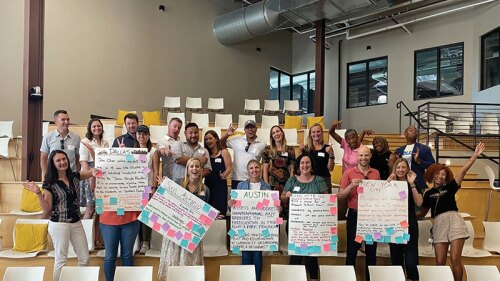By Matt Norris
Access to fresh food is a top priority or a high priority for 73 percent of U.S. residents, according to America in 2015: A ULI Survey of Housing, Transportation, and Community. This statistic raises important questions for real estate developers, public health advocates, and civic leaders about how food can be leveraged to improve health, the environment, social equity, and food-system security—all while enhancing asset values. How are real estate developers and cities responding to a growing consumer interest in food access and sourcing? How are they working food into their projects? And what role do real estate developers play in expanding food access for underserved communities?
To explore these questions, ULI convened real estate developers, food producers, planners, restaurateurs, public health professionals, and other individuals working in the food and development sectors in February for the inaugural Food and Real Estate Forum. Held in the food-centric city of New Orleans, the forum explored challenges, trends, and opportunities for real estate and urban development presented by food, with a focus on food access, food as a revitalization strategy, and food as an economic ladder. A second forum will be held in Westchester County, New York, in May.
The New Orleans forum was opened by Jodie McLean, EDENS chief executive officer (CEO) and forum chair. She stated that community “starts around the table” and explained that real estate projects have a central role in promoting well-being by serving to create places that reduce social isolation and foster community links.
Through site tours, dialogues with developers, panel discussions, and facilitated group conversations, forum participants noted that food can be a powerful driver not just in helping a development project meet economic goals, but also in promoting improved social and environmental outcomes. Many of the forum attendees explained that food-focused places and venues—restaurants, food halls, markets, community gardens, and farms—can serve to create a sense of attachment among tenants and consumers to development projects while also fostering stronger social ties within a community.
Forum panelist Jeremy Hudson, CEO of Specialized Real Estate Group, described why his company places significant emphasis on incorporating food growing in residential development, stating, “Our motivation is to build community,” he said. “By retrofitting multifamily developments to include community gardens, we are able to provide an amenity that promotes sustainability, health, and tenant social interactions. The relatively small investment in food growing provides large dividends for our residents, as well as [for] our company.”
Although many people may not have the time or the desire to grow food themselves, Hudson noted that employing an on-site gardener to tend community gardens is an inexpensive investment relative to the value generated. Community gardens can attract and retain residential tenants while also supporting community social interaction. According to the National Garden Association, the number of households participating in community gardening increased by 200 percent, from 1 million households in 2008 to 3 million in 2013.
Even as local food growing has expanded significantly in recent years, participants and panelists noted that basic access to healthy foods is a pressing issue for underserved communities and that the real estate sector has the power to respond to this problem.
According to the U.S. Department of Agriculture (USDA), over 2.3 million households in the United States live more than a mile (1.6 km) from a supermarket and also lack access to a motor vehicle, which can constrain a consumer’s ability to buy affordable and nutritious food. More than 14 percent of U.S. households are classified as “food insecure” by the USDA, meaning that their “access to adequate food and nutrition [is] limited due to cost, proximity, and/or other reasons.”
Donna Leuchten Nuccio, director of Healthy Food Access at the Reinvestment Fund, explained that financing for grocers and other food retailers in low-income communities can be a barrier: “There is a need for more retailers and restaurants with healthy food options to operate in low-income areas, [but] in order for these businesses to be economically viable, retailers may need support from community development financing institutions or government programs, such as the Healthy Food Financing Initiative.”
Forum attendees explained that food retail jobs can provide upward mobility without barriers around education and experience, and that partnerships between developers and established local nonprofit groups, anchor businesses, and public sector officials can facilitate food-related job training programs or can lead to the inclusion of food incubators (services that support food business startups) in local development projects.
Participants also noted that transportation is inextricably linked to healthy food access. Investments in safe, affordable, and active transportation options such as public transit, walking, and bicycling can support food-centric development projects while expanding access to healthy food outlets for people of all ages, abilities, and income levels.
The forum highlighted the fact that real estate leaders can capitalize on growing interest in local, sustainable food and authentic experiences to improve outcomes for health, sustainability, food access, and community cohesion, all while supporting improved financial returns.
The outcomes of the New Orleans and New York food forum will lead to a ULI publication focused on food and real estate, which will incorporate lessons learned across a broad spectrum of issues related to food and real estate.
Matt Norris is a senior associate with the content team at the Urban Land Institute.




